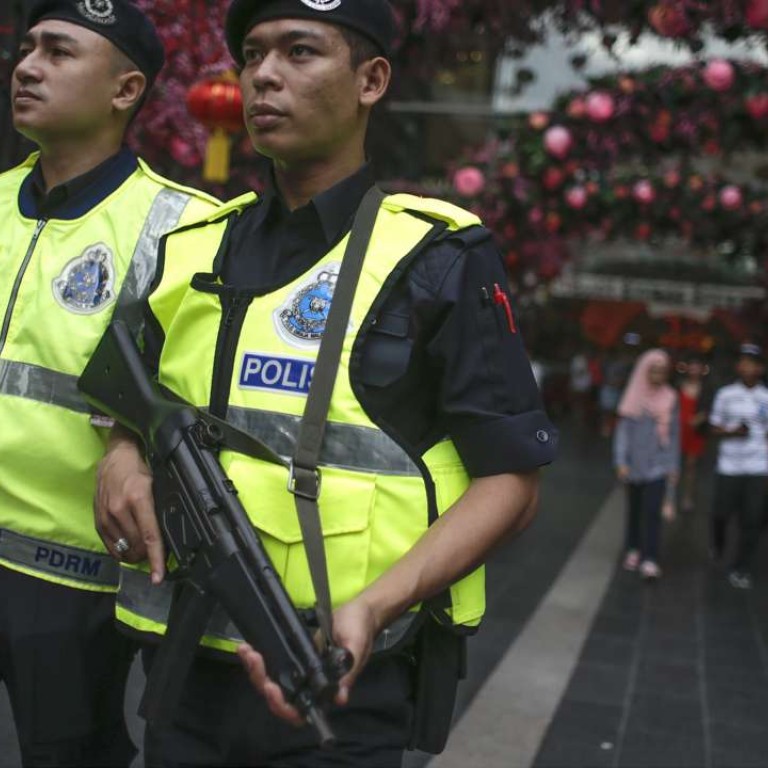
Exclusive: Suspected Islamic State supporter arrested in Malaysia is safety expert on VIP flights, security official says
The aviation engineer, who used to work for the Royal Malaysian Air Force, is alleged to have supported Islamic State on his Facebook account
One of 15 suspected Islamic State supporters arrested in Malaysia has been revealed as a senior aviation technician for a firm that serviced aircraft used by the nation’s corporate and political leaders.
The suspect, aged 49, is a former flight engineer for the Royal Malaysian Air Force, a regional security source told the South China Morning Post.
“The suspect is a senior technician whose responsibility was to check that an aircraft is safe for use. He is the person who gives the green light whether an aircraft is safe to take off or not,” said the security official.
Such a person would have the ability, at least in theory, to sabotage an aircraft with VVIPs on board
The aircraft maintenance company services chartered aircrafts for domestic flights for so-called “VVIPs”, a term often used to describe passengers who are corporate and political leaders. The suspect worked there for 13 years, according to the official.
He was arrested in late March along with 14 other suspects in an operation covering six states as well as the capital Kuala Lumpur.
The other 14 suspects have all been charged in court, but investigations into the aviation engineer are continuing.
“He has conducted religious classes where he propagated ISIS ideology,” said the official.
“He is known to actively support ISIS via his Facebook account. He has shown ISIS videos on his mobile phone to his friends with the aim of promoting ISIS .”
An Airbus A321 operated by Russia’s Metrojet crashed in the Sinai in 31 October 2015, killing all 224 people on board. Russia and Western governments have said the plane was likely brought down by a bomb, and the Islamic State militant group said it had smuggled an explosive on board.
Reuters reported in January that an EgyptAir mechanic, whose cousin joined Islamic State in Syria, is suspected of planting the bomb, according to sources familiar with the matter.
The official said the Malaysian technician’s links to ISIS “was very worrying.”
“He could easily sabotage an aircraft. He could also put bombs or smuggle weapons onto a plane,” said the official.

Counter-terrorism experts described the technician as a potential “insider threat”.
“This is a matter for concern because this is precisely what I and others have referred to as the ‘insider threat’ of transnational terrorism,” said Associate Professor Kumar Ramakrishna, head of policy studies at the S. Rajaratnam School of International Studies Singapore.
The “insider threat” is dangerous as it enables IS to attack targets from within the system, by recruiting already self-radicalised individuals in sensitive jobs, said Kumar.
“Such a person would have the ability, at least in theory, to sabotage an aircraft with VVIPs on board either through by deliberately tampering with onboard systems, causing them to fail in mid-flight, or by placing an improvised explosive device onboard, assuming that he can gain access to one, or has the ability make one himself,” said Kumar.
Such an insider also had the potential to directly assassinate a target, “because the person presumably would have the necessary security clearance already and would hence be less likely to attract attention. This is why enhanced and more regular security screenings are required in certain sensitive sectors,” said Kumar.
The engineer is the second suspect in the aviation industry to have been arrested by Malaysian police over their alleged support for IS.
Last year, an armed auxiliary police officer who handled the screening of explosives and dangerous goods at the Kuala Lumpur International Airport I was arrested.
He is alleged to have helped facilitate his brother-in-law’s departure to Syria to fight for IS by escorting him to immigration, where the officer’s presence helped ensure there would be less scrutiny paid to the passenger’s final destination.
To date, Malaysian police have arrested more than 160 IS suspects. At least 19 Malaysians are known to have died in Iraq and Syria fighting for IS, some of them as suicide bombers.
The engineer’s arrest comes more than two years after the start of one of the most enduring mysteries in aviation history.
Malaysia Airlines Flight MH370 vanished on March 8, 2014 en route from Kuala Lumpur to Beijing with 239 passengers and crew on board, mostly Chinese and Malaysians.
Authorities believe the Boeing 777 detoured to the remote southern Indian Ocean and then plunged into the water.

